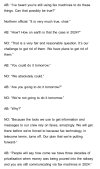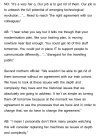-
Our new ticketing site is now live! Using either this or the original site (both powered by TrainSplit) helps support the running of the forum with every ticket purchase! Find out more and ask any questions/give us feedback in this thread!
You are using an out of date browser. It may not display this or other websites correctly.
You should upgrade or use an alternative browser.
You should upgrade or use an alternative browser.
Northern Still Using FAX Machines
- Thread starter DC1989
- Start date
- Status
- Not open for further replies.
Sponsor Post - registered members do not see these adverts; click here to register, or click here to log in
R
RailUK Forums
Peterthegreat
Established Member
Do you have a source for this?So it's been reported today that Northern are blaming unions on the reason they still use fax machines in 2024....could this be true or just another example of union bashing?!
It's from this mornings rail north committee with Andy BurnhamDo you have a source for this?
I'm sure quite sure how to link twitter posts on here but below are the fax machine meetings reported by the Financial Times
https://x.com/JenWilliams_FT/status/1851562473968607645?t=yjLL7gMaspELayu2Msx-QQ&s=19


Couru
Member
That sounds like pure blame-shifting to me. It's basically saying "we would've proposed it but we couldn't be bothered to go through the process"."We wouldn't be able to get rid of them tomorrow without an agreement with our trade unions... we have an agreement to use processes that we have and in order to change that, we do have to change the agreement.
Bletchleyite
Veteran Member
That sounds like pure blame-shifting to me. It's basically saying "we would've proposed it but we couldn't be bothered to go through the process".
If fax machines are working, why bother about it? The airline industry still uses dot-matrix printers to print loading sheets in triplicate because it still works.
The railway has plenty of tech still in use that's older than fax machines!
jonnyfan
Member
The use of fax machines is the very least of Northern's worries. But it is a nice little distraction to the real issues of poor management and inability to recruit and train efficiently.
Blackpool boy
On Moderation
It is the least of their worries but it was Andy Burnham who asked abou tthem in the first placeThe use of fax machines is the very least of Northern's worries. But it is a nice little distraction to the real issues of poor management and inability to recruit and train efficiently.
It's not the fact of using fax that will astonish the public (hospitals stuck with pagers because they were a more confidential method of messaging ) but that changing the process would be a matter of union negotiation. When schools switched from paper registers to electronic ones it didn't involve negotiation with the unions representing teachers and office staff. It was a management decision. End of.
Which, if any, TOCs have stopped using fax machines?It is the least of their worries but it was Andy Burnham who asked abou tthem in the first place
Blackpool boy
On Moderation
No idea. Was surprised some still do but im aware there are other businesses out there who still use them.Which, if any, TOCs have stopped using fax machines?
12LDA28C
Established Member
- Joined
- 14 Oct 2022
- Messages
- 5,058
Which, if any, TOCs have stopped using fax machines?
Some TOCs certainly have. The more modern way of sending documents is by scanning and emailing, done via multi-function printers/scanners, although of course they then still need printing by the recipient.
Tractor2018
On Moderation
- Joined
- 31 Jan 2018
- Messages
- 191
It's not the fact of using fax that will astonish the public (hospitals stuck with pagers because they were a more confidential method of messaging ) but that changing the process would be a matter of union negotiation. When schools switched from paper registers to electronic ones it didn't involve negotiation with the unions representing teachers and office staff. It was a management decision. End of.
"End of" displays your core attitude, one which is generally alien to the industry - thankfully.
You often display a lack of industry knowledge on this forum, which is fine, as you're not in it. But to pass it off as you often do as fact isn't constructive for those reading what you post.
And the attitude shown in the quoted post only highlights this.
Thankfully in the industry, things are often negotiated, or discussed so that everyone is on the same page and has come to a clear understanding and that new technology is actually beneficial to everyone and the job.
So firstly, when you say "union negotiation" that's actually a misnomer. Very similar to the media saying "union rules". Things are neither of these - they're a negotiation and an agreement between all parties involved.
Secondly, these agreements will usually only happen once everyone thinks it's a good idea - and not just when a company, or you, says "end of".
As Bletch pointed out, if the current process, no matter how antiquated, is currently fulfilling it's function, there would need to be a good reason to move on from that. I mean, why would you? Just to tick a box that implies to some you've modernised? When all you've done is spent money when it wasn't required.
"End of" displays your core attitude, one which is generally alien to the industry - thankfully.
You often display a lack of industry knowledge on this forum, which is fine, as you're not in it. But to pass it off as you often do as fact isn't constructive for those reading what you post.
And the attitude shown in the quoted post only highlights this.
Thankfully in the industry, things are often negotiated, or discussed so that everyone is on the same page and has come to a clear understanding and that new technology is actually beneficial to everyone and the job.
So firstly, when you say "union negotiation" that's actually a misnomer. Very similar to the media saying "union rules". Things are neither of these - they're a negotiation and an agreement between all parties involved.
Secondly, these agreements will usually only happen once everyone thinks it's a good idea - and not just when a company, or you, says "end of".
As Bletch pointed out, if the current process, no matter how antiquated, is currently fulfilling it's function, there would need to be a good reason to move on from that. I mean, why would you? Just to tick a box that implies to some you've modernised? When all you've done is spent money when it wasn't required.
Agreed but then why don't the management make that case? Instead making it seem like a crazy conversation from yes minister, say yes we use fax and think it's better for our use than email because of x,y and z.
As it is, it just looks like a big reason why public sector productivity (Yes I know technically it's not public sector) has been flat for 25+ years whilst private sector has increased.

Goldfish62
Veteran Member
- Joined
- 14 Feb 2010
- Messages
- 11,871
I honestly didn't know fax was still a thing.  I assumed the whole system had been switched off years ago.
I assumed the whole system had been switched off years ago.
My hazy memories of using it decades ago were that it was utter c**p. Jammed printers, unreadable faxes, engaged lines, faxes simply not appearing.
Then along came widespread adoption of email and that was the end of that.
My hazy memories of using it decades ago were that it was utter c**p. Jammed printers, unreadable faxes, engaged lines, faxes simply not appearing.
Then along came widespread adoption of email and that was the end of that.

Tractor2018
On Moderation
- Joined
- 31 Jan 2018
- Messages
- 191
Agreed but then why don't the management make that case? Instead making it seem like a crazy conversation from yes minister
You'd really need to ask them
 All I can say with certainty is, as the quoted text from that meeting shows, I've found over the years rail management is VERY good at shooting itself in the foot - there often seems to be a self destruct air about them. It's a generalisation of course, some very good people are around, but the balance has tipped the wrong way for a while now.
All I can say with certainty is, as the quoted text from that meeting shows, I've found over the years rail management is VERY good at shooting itself in the foot - there often seems to be a self destruct air about them. It's a generalisation of course, some very good people are around, but the balance has tipped the wrong way for a while now.It's not the fact of using fax that will astonish the public (hospitals stuck with pagers because they were a more confidential method of messaging ) but that changing the process would be a matter of union negotiation. When schools switched from paper registers to electronic ones it didn't involve negotiation with the unions representing teachers and office staff. It was a management decision. End of.
Well on the railway if management want to implement changes they need to be negotiated, not imposed. What happens in other industries is completely irrelevant. End of.
My post generated the range of responses I expected!
What happens in other industries is not completely irrelevant, particularly when you are a (rightly) subsidised service industry.
It's not a good look, and that, like it or not, is important
What happens in other industries is not completely irrelevant, particularly when you are a (rightly) subsidised service industry.
It's not a good look, and that, like it or not, is important
I don't have an issue with them using fax machines. If the system works, then why change it? Nothing wrong with fax machines as a form of communication. To be honest, with the ever increasing electronic surveillance and eavesdropping, I genuinely believe that old style analogue communication methods like fax machines will have a comeback in the next few years. Much like pagers in the Middle East.
Tractor2018
On Moderation
- Joined
- 31 Jan 2018
- Messages
- 191
My post generated the range of responses I expected!
What happens in other industries is not completely irrelevant, particularly when you are a (rightly) subsidised service industry.
It's not a good look, and that, like it or not, is important
You realise it just looks like you're jumping up and down on the spot now?
What IS irrelevant, is your mention of a "subsidy". Is it a subsidy if it generates a net profit for the economy? Or is it an investment in the country?
Can we establish it's an adult thing for the people concerned to have conversations and come to agreement? And that a profitable investment in the country is a good thing?
I'm not sure about the substance of how something "looks". It's generally a consideration of people who would like an opinion, but are irrelevant to the matter in hand.
Well on the railway if management want to implement changes they need to be negotiated, not imposed.
For some parts of the railway. But not for most of it.
Union negotiations can actually be helpful as they give a different perspective on proposed changes and consequent implications that would be very difficult for management to work through themselves.
However, you still have to keep an eye out for the unions taking the piss, and I always take a very dim view of demands for technology payments for changes which aren't really an imposition, or indeed make the work of traincrew easier.
However, you still have to keep an eye out for the unions taking the piss, and I always take a very dim view of demands for technology payments for changes which aren't really an imposition, or indeed make the work of traincrew easier.
LNW-GW Joint
Veteran Member
The latest "railway in the dark ages" story to surface is the apparent admission by Northern officials that they still rely on fax communication to train crew.
This emerged at a Rail North Northern performance review chaired by Andy Burnham, Mayor of GM.
https://www.theguardian.com/busines...n-uses-fax-machines-send-messages-train-crews
What is the actual truth behind this apparent inability to use modern technology (email, apps etc)?
Has it been an issue in the recent union disputes with TOC managements, now supposedly resolved at the DfT level?
Do other TOCs have similar technology issues?
Could they ditch FAX machines "tomorrow"?
The Guardian notes that Northern has been a DOHL TOC for over 4 years and is therefore under public control.
.
This emerged at a Rail North Northern performance review chaired by Andy Burnham, Mayor of GM.
https://www.theguardian.com/busines...n-uses-fax-machines-send-messages-train-crews
The rail operator Northern has said it still uses fax machines to communicate vital messages to train crews.
The train company made the admission at an extraordinary meeting of the rail north committee, chaired by the mayor of Greater Manchester, Andy Burnham, on Wednesday morning at which Northern was asked to account for its poor performance, including repeated “do not travel” messages issued to passengers on Sundays.
Burnham asked one of the two Northern officials present: “I’ve heard you’re still using fax machines. Can that possibly be true?”
The official replied: “It is very much true,” prompting an incredulous Burnham to ask: “How on earth is that the case in 2024?”
Andy Burnham asked Northern officials why the company had not got rid of fax machines ‘years ago’.
When asked by Burnham why Northern could not get rid of fax machines “tomorrow”, the official replied: “The tools we use to get messaging and information to our crew rely on faxes, amazingly.”
He added: “It is our challenge to get rid of them. It’s in our plans to get rid of them.”
The second official present at the meeting suggested it would need the agreement of trade unions to switch to digital technology. “We wouldn’t be able to get rid of them tomorrow without an agreement with our trade unions,” she said. “So we have to look at these issues with the depth and complexity that they have.”
In response, Burnham said: “Personally, I don’t think many people watching this would imagine replacing fax machines as issues of depth and complexity, and while it may need agreement with trade unions, people would just say … well, why wasn’t that done years ago?”
What is the actual truth behind this apparent inability to use modern technology (email, apps etc)?
Has it been an issue in the recent union disputes with TOC managements, now supposedly resolved at the DfT level?
Do other TOCs have similar technology issues?
Could they ditch FAX machines "tomorrow"?
The Guardian notes that Northern has been a DOHL TOC for over 4 years and is therefore under public control.
.
59CosG95
Established Member
On the plus side of Fax machines, despite them being "arcane tech", they are nigh-on unhackable. The NHS still widely uses them, as does Japan.
The NHS still uses them, but what is more secure? A password protected email or a fax that prints regardless of who is in the room to see it?On the plus side of Fax machines, despite them being "arcane tech", they are nigh-on unhackable. The NHS still widely uses them, as does Japan.
jfowkes
Member
- Joined
- 20 Jul 2017
- Messages
- 1,141
Are they? The data is normally sent unencrypted and both the data and sender are normally unauthenticated. It would seem fairly trivial to compromise a fax based system in any number of ways.On the plus side of Fax machines, despite them being "arcane tech", they are nigh-on unhackable. The NHS still widely uses them, as does Japan.
Merle Haggard
Established Member
Well on the railway if management want to implement changes they need to be negotiated, not imposed. What happens in other industries is completely irrelevant. End of.
Back in B.R. days some changes that, under Union agreements, were 'negotiation' and others that were 'consultation'. That was a very important distinction, but I have no idea if it still applies
The NHS still uses them, but what is more secure? A password protected email or a fax that prints regardless of who is in the room to see it?
The reference to unhackable refers to the ability of lack of to intercept a fax enroute. For this reason they are still used for some legal agreements.Are they? The data is normally sent unencrypted and both the data and sender are normally unauthenticated. It would seem fairly trivial to compromise a fax based system in any number of ways.
But in terms of the NHS example raised hacking is only one part of the issue. Th bigger one is having no control over who sees the fax as it arrives.The reference to unhackable refers to the ability of lack of to intercept a fax enroute. For this reason they are still used for some legal agreements.
I don't work for the nhs, so I don't know what controls they have but it is fairly easy to install passwords on fax machines. I've worked for companies where you have to enter your password at the printer to get things printed, I'm sure the same can apply to faxes.But in terms of the NHS example raised hacking is only one part of the issue. Th bigger one is having no control over who sees the fax as it arrives.
- Status
- Not open for further replies.
